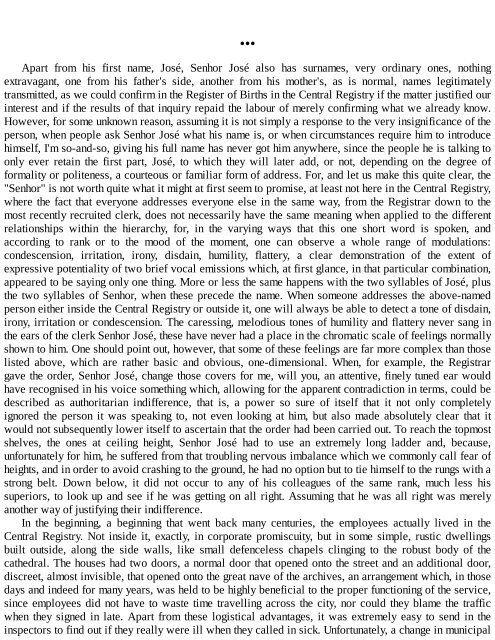Create successful ePaper yourself
Turn your PDF publications into a flip-book with our unique Google optimized e-Paper software.
...<br />
Apart from his first name, José, Senhor José also has surnames, very ordinary ones, nothing<br />
extravagant, one from his father's side, another from his mother's, as is normal, names legitimately<br />
transmitted, as we could confirm in the Register of Births in the Central Registry if the matter justified our<br />
interest and if the results of that inquiry repaid the labour of merely confirming what we already know.<br />
However, for some unknown reason, assuming it is not simply a response to the very insignificance of the<br />
person, when people ask Senhor José what his name is, or when circumstances require him to introduce<br />
himself, I'm so-and-so, giving his full name has never got him anywhere, since the people he is talking to<br />
only ever retain the first part, José, to which they will later add, or not, depending on the degree of<br />
formality or politeness, a courteous or familiar form of address. For, and let us make this quite clear, the<br />
"Senhor" is not worth quite what it might at first seem to promise, at least not here in the Central Registry,<br />
where the fact that everyone addresses everyone else in the same way, from the Registrar down to the<br />
most recently recruited clerk, does not necessarily have the same meaning when applied to the different<br />
relationships within the hierarchy, for, in the varying ways that this one short word is spoken, and<br />
according to rank or to the mood of the moment, one can observe a whole range of modulations:<br />
condescension, irritation, irony, disdain, humility, flattery, a clear demonstration of the extent of<br />
expressive potentiality of two brief vocal emissions which, at first glance, in that particular combination,<br />
appeared to be saying only one thing. More or less the same happens with the two syllables of José, plus<br />
the two syllables of Senhor, when these precede the name. When someone addresses the above-named<br />
person either inside the Central Registry or outside it, one will always be able to detect a tone of disdain,<br />
irony, irritation or condescension. <strong>The</strong> caressing, melodious tones of humility and flattery never sang in<br />
the ears of the clerk Senhor José, these have never had a place in the chromatic scale of feelings normally<br />
shown to him. One should point out, however, that some of these feelings are far more complex than those<br />
listed above, which are rather basic and obvious, one-dimensional. When, for example, the Registrar<br />
gave the order, Senhor José, change those covers for me, will you, an attentive, finely tuned ear would<br />
have recognised in his voice something which, allowing for the apparent contradiction in terms, could be<br />
described as authoritarian indifference, that is, a power so sure of itself that it not only completely<br />
ignored the person it was speaking to, not even looking at him, but also made absolutely clear that it<br />
would not subsequently lower itself to ascertain that the order had been carried out. To reach the topmost<br />
shelves, the ones at ceiling height, Senhor José had to use an extremely long ladder and, because,<br />
unfortunately for him, he suffered from that troubling nervous imbalance which we commonly call fear of<br />
heights, and in order to avoid crashing to the ground, he had no option but to tie himself to the rungs with a<br />
strong belt. Down below, it did not occur to any of his colleagues of the same rank, much less his<br />
superiors, to look up and see if he was getting on all right. Assuming that he was all right was merely<br />
another way of justifying their indifference.<br />
In the beginning, a beginning that went back many centuries, the employees actually lived in the<br />
Central Registry. Not inside it, exactly, in corporate promiscuity, but in some simple, rustic dwellings<br />
built outside, along the side walls, like small defenceless chapels clinging to the robust body of the<br />
cathedral. <strong>The</strong> houses had two doors, a normal door that opened onto the street and an additional door,<br />
discreet, almost invisible, that opened onto the great nave of the archives, an arrangement which, in those<br />
days and indeed for many years, was held to be highly beneficial to the proper functioning of the service,<br />
since employees did not have to waste time travelling across the city, nor could they blame the traffic<br />
when they signed in late. Apart from these logistical advantages, it was extremely easy to send in the<br />
inspectors to find out if they really were ill when they called in sick. Unfortunately, a change in municipal



